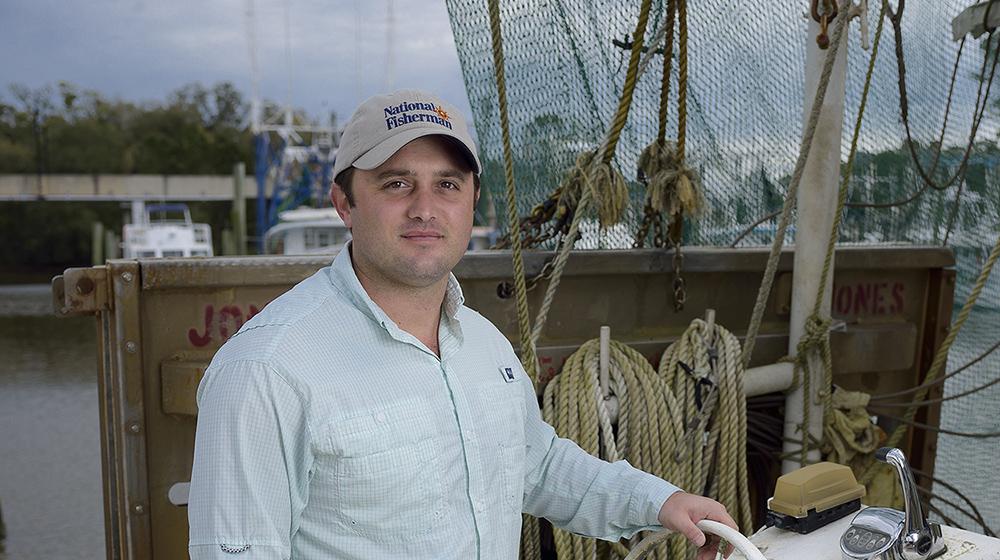Saving the Sound

Ryan Bradley worked with the Mississippi State University Coastal Research and Extension Center in Biloxi to incentivize sustainable practices.
Program engages fishing community to curb marine debris
Story by Nathan Gregory · Photos by Kevin Hudson
When Ryan Bradley wanted to help make the Mississippi Sound cleaner and more profitable for commercial shrimpers, he knew where to turn for help launching a cleanup program.
He approached personnel at the Mississippi State University Coastal Research and Extension Center (CREC) in Biloxi to develop a reward system that incentivizes sustainable practices and environmental awareness.

A commercial angler himself, Bradley saw a need to address the hazards of marine debris in coastal water bottoms— specifically, derelict crab traps, or traps that had been abandoned or lost. The program he spearheaded is funded by the Environmental Protection Agency’s Gulf of Mexico Program, and it offers money to those who properly dispose of the traps in four locations along the Gulf Coast.
The project team is led by Dr. Eric Sparks, associate Extension professor at CREC, and includes assistant Extension professor Dr. Ben Posadas and Extension program assistants Sarah Cunningham and Alyssa Rodolfich. Other partners include Thao Vu, director of the Mississippi Coalition of Vietnamese-American Fisher Folks and Families, and Caitlin Wessel, Gulf of Mexico regional coordinator with the National Oceanic and Atmospheric Administration’s Marine Debris Program.
Sparks says the overall goal of the program is to reduce the amount of trash littering the sound and increase awareness of the impacts marine debris has on coastal communities.
“We are going to use the data collected from this project to develop outreach materials and management tools to address marine debris,” he says. “We want this information to benefit not only fishing communities and coastal economies, but the general public.”
Removing derelict crab traps from fishing nets costs time and money, both of which are in short supply for shrimpers.
“You can lose a significant portion of your catch and tear up your net,” Bradley explains. “Storing these traps while you’re on a trip takes up a lot of space on your boat, and you’ll have instances where they are thrown back into the water where they can continue to cause damage to shrimp operations. That’s the behavior we are trying to change.”
Crab trap lines can be cut by high winds, along with speedboats and other recreational vessels that run over them. High tides and storms can carry traps out to sea.
“I’ve been participating in the crab industry since 1986 and started shrimping around 1990, so I’m on both sides of this,” explains commercial fisherman Frank Parker. “In the last 5 years, I’ve personally lost around 500 crab traps. If you catch one trap in your trawl, you could lose $2,000 to $3,000 worth of shrimp in one drag.”
The reward program is not the only component of the Extension-led project. This summer, 20 shrimpers are working with Extension and the NOAA Marine
Debris Program to log each time they collect debris in their nets.
“Shrimpers will log every occurrence of marine debris while out fishing,”
Cunningham says. “They will also be collecting water samples that we can analyze for microplastics.”
The third project component is education and outreach. Extension and Mississippi Commercial Fisheries United are also collaborating with the Mississippi Coalition of Vietnamese-American Fisher Folks and Families to provide bilingual educational materials and translation services to commercial fishers of Vietnamese descent on the Gulf Coast.
After the derelict crab trap program ends in 2020, Extension will produce a public service announcement geared toward shrimpers and recreational boaters.
“We want to explain how tossing traps back into the water affects shrimpers’ bottom line,” Cunningham says. “The video can show other boaters how speeding over the lines hurts our commercial fishermen and why people should be concerned about marine debris even if they’re not a shrimper or a crabber.”
Bradley says Extension was the ideal choice to manage all aspects of the program. “Extension’s overall scope and reach provide a good platform for us to work through,” he says. “They are a solid partner we can depend on to be the foundation for this project.”


